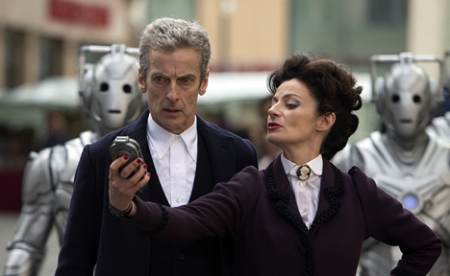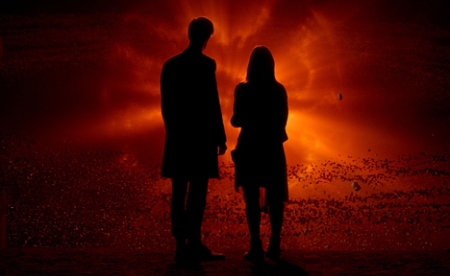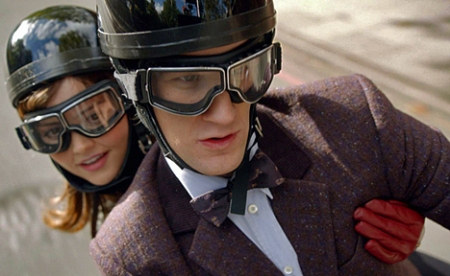STORY
Danny Pink is dead, killed whilst crossing the street. Such a pointless death is more than Clara can bare and she goes to drastic lengths to get The Doctor involved. But what they discover in their search for an afterlife is an insidious plan to turn the world’s dead into an unstoppable army…and there’s only one nemesis of The Doctor crazy enough to dream up such a scheme.
REVIEW
Peter Capaldi’s first series in the TARDIS driving seat has been a mixed bag of sorts; there have been wonderful high points (“Listen”, “Flatline”) and dismal low points (“The Caretaker”, “Mummy On The Orient Express”) but what makes “Dark Water” and “Death In Heaven” something of a chore is the fact that this two-part series finale remains firmly in the middle at all times, never getting dull or annoying but never rising to greatness either. And that’s not to say that there aren’t great moments, as there most certainly are, but they are too few and far between.
Danny’s untimely demise sends Clara into a bit of a state (understandably) and she tries to get The Doctor to go back and change history, in a scene where she threatens him by taking them both to a volcano and throwing the spare TARDIS keys into the lava, one by one. It’s a compelling sequence, sure, but the whole time I was thinking “Can’t The Doctor just snap his fingers and the TARDIS doors will open anyway?” The whole thing turns out to be a deceit; The Doctor slapped a dreaming patch on Clara’s neck beforehand and let her play out the scenario in her mind because he was curious to see how far she would go. Now that he knows, he says that he will help her anyway, leaving Clara flummoxed; she’s just betrayed him, in thought if not in actual deed, so why would The Doctor forgive her? His answer to that is a rather touching display of rare emotion from Ole’ Twelve and adds another little flourish to Capaldi’s evolving portrayal.
And so we’re off! Off to find the afterlife, off to rescue Danny, The Doctor and Clara facing their greatest personal challenge! Only thing is, the whole enterprise is about to get sidetracked by a mystery plot that involves the return of that most un-stay-deadable of villains, The Master. Clara and The Doctor uncover a company named 3W who are storing bodies in water tanks, where recurring mystery character Missy shows up and plays host. She’s clearly not what she seems but The Doctor is struggling to figure out what’s really happening with all of these corpses. Meanwhile Danny wakes up in the Nethersphere – a supposed afterlife where he learns that he can purge all of his emotions and let go of his guilt over having killed a child when he was a soldier (yawn to this development at this late stage in the game). But, in fact, the Nethersphere is a piece of Gallifreyan technology that houses the consciences of thousands of dead people, all of whom are about to get an upgrade when they’re downloaded back into their bodies. Yes, the Cybermen seen all over the trailers and promotional images for this finale are the newly revived dead members of the human race, brought back as an army to outnumber the living in a plan conceived by The Master…who is a now a woman.
The amount of online fury and verbal diarrhoea that greeted the reveal of Michelle Gomez’s Missy as actually being The Master was truly shocking. I mean, come the fuck on; in “The TV Movie”, The Master was a gelatinous CGI ghost snake who deep-throated Eric Roberts. THAT HAPPENED! THAT IS CANON! But making The Master a woman?! Holy fucknuggets, now you’ve really crossed the line! Leaving aside the bigoted bullshit of a portion of the Whovian fanbase, who don’t deserve to call themselves fans, is Michelle Gomez actually any good in the role? Personally, I would say yes, she’s great…but I hope to see her return and do more with the character. Her unhinged, maniacal Missy is a treat but occasionally she slips too close to John Simm style histrionics and certainly I prefer the moments where Gomez instead shows flashes of vicious cruelty instead of over-the-top flirting.
So after all of the build up and with the pieces all in place, what follows is little more than watchable. Missy reveals that she’s created the Cyberman army as a gift for The Doctor, which he of course rejects, leading to CyberDanny making “the ultimate sacrifice” and using himself and the other Cybermen to destroy the scary rain and remove the threat. Then we get the laughable introduction of The Brigadier, resurrected as a Cyberman, supposedly killing Missy and then blasting off to have further adventures that nobody in their right mind wants to see. It’s a massive let down in story terms because this could have been an incredible finale, with The Doctor facing off against Missy and her army, having to do something drastic to put things right, but instead it’s all settled after one conversation in a grave yard. And I won’t even bother getting into the whole thing with Danny sending the dead boy back to the land of the living instead of coming back himself…
On the plus side, Peter Capaldi gives everything he’s got in this last story of series 8. There are moments of quality sarcasm (dealing with the “boy scout” on the plane), heroic grandstanding (“I…am…an idiot! With a box and a screwdriver, passing through, helping out, learning.”), heartbreaking fury (smashing the TARDIS console) and deep sadness (“Never trust a hug…”), all of which are delivered perfectly. With all the issues I may have taken with various episodes this series, Capaldi’s performance has never been one of them; he is a fantastic Doctor and I can’t wait to see him grow in the role and bring even more facets to his portrayal. Long may he reign…but hopefully with some better quality stories behind him, eh?
RATING
As series finales go, this two-parter does a decent job of raising the stakes, returning a classic villain in a new iteration and throwing a bit of fan service in for good measure. But it doesn’t quite pack enough punch to elevate it beyond watchable. Fine performances all around from the main cast and the supporting cast will hold your interest, whilst the story itself will slip in and out of your attention. It’s not bad, but it ain’t great, leading to a final score of 6/10.
Written and edited by Richey Hackett









